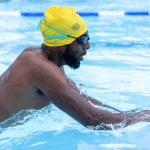How good do you want to be (and how hard will you work for it)?
ave you ever dreamed of being a faster swimmer, being able to conquer great distances or swim in near-freezing water? Outcome goals such as ‘Swim the English Channel’, ‘Break 18 minutes for a 1500m swim’ or ‘do an Ice Mile’ are easy to write down and pin on the fridge door. However, while goal setting might inspire and energise you, there’s also a dark side.
There’s an old joke about a woman who goes to a piano recital. She is so moved by the music she tells the pianist, “I’d give half my life to be able to play the piano like that,” to which the pianist replies, “I did, my dear, I did.” Those 60 minutes of virtuoso music took years of studying, practice and finger drills to perfect.
We’ve compared swimming with music before and there’s certainly a parallel in the need to put the hours in to get the results out. Elite swimmers will typically swim twice per day for two hours at a time. They will wake up at four in the morning to be ready for training at five, and some may have been doing this for 10 years or more. On top of that they will stretch, lift weights, do circuits and probably spend a fair bit of time eating. They literally do give half of their lives to swim at the level they do.
In our April/May 2014 issue we will hear from Matt Dawson, who after spending several years training for triathlon decided he wanted to swim the English Channel. Matt’s pursuit of his English Channel goal was unrelenting, with frequent weekend trips from London to Bournemouth for six hour training swims in the sea, regardless of how little sleep he got the night before. He’d then rush back to spend time with his young children and during the week he’d constantly juggle work, training and family.
Like elite swimmers, Matt’s dedication is admirable and his success well-deserved, but not everyone wants to put themselves through the same hardships. That’s not a fault or a weakness, it’s a life-style choice.
Achieving a major goal requires hard work, sacrifice and a dose of luck, so when we set goals we should ask whether the effort and risk needed to achieve them is worth it. Some goals also have big financial costs, and there are always alternative ways of spending your hard-earned cash. While this is all quite obvious it’s worth remembering. It’s also quite liberating as we can let go of goals that are unrealistic given the amount we want to give up to achieve them. When we say things like, “I wish I could swim faster” often what we mean is, “I wish I could swim faster without putting in any extra effort or training or giving up those mornings in bed.” And that, mostly, is not going to happen.
Swimming need not always be about going faster or further. It’s quite acceptable to relax and simply enjoy swimming for the pleasure of being in the water.
That’s not to say there isn’t a time and place for setting swimming related goals – making sure you are fully aware of the consequences if you do – but don’t feel you have to. Swimming, especially open water swimming, can be a welcome respite from the unrelenting pressures of modern life, a time when you don’t set goals or push yourself to hit targets.
Through H2Open Magazine we aim to provide you with the tools you need to pursue swimming related goals if that’s what you want to do. We also hope to share the delights of open water swimming that are there to be enjoyed whatever your current ability or aspirations.
You can find out more about what we publish here.






